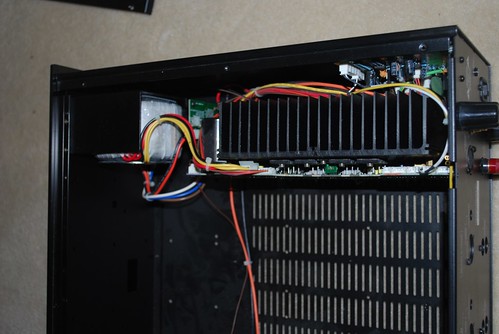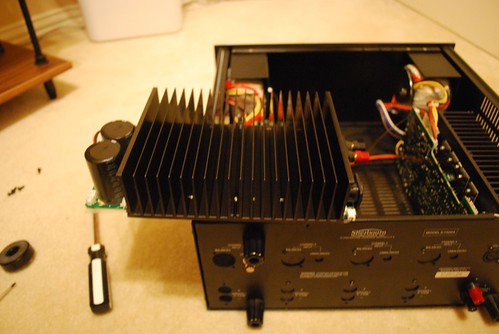Hello everyone,
I work in the sales and system design end of the A/V industry, but am extremely new to most of the actual repair and workings of two amplifiers I own. I have a 5ch. and a 2ch. Sherbourn amplifier 5/1500A. The chassis are the same and are of a modular card design. Each channel has its own card and transformer. In at least two channels on the five channel and one channel on the two channel I am have the same issues. There is crackling and sometimes the channel won't work at all. From what I am reading, this could potentially be a problem with the caps going bad. Is this the case? The amplifiers are 12-13 years old. I have never done any major repair like this in the past, but am interested in the undertaking. If it is indeed the caps going bad, what should I replace them with? I would like to replace them all at once so the amp continues to work down the road and the channels are matched. I am not sure if the caps may have any bearing on the overall tonality of the amps, but if I could I would warm them up a bit. For my taste, they are too analytical with my Monitor Audio GS60's. What tools and parts would I need and can I do this as a newbie? Any other parts I should replace at the same time? Any other advice would be appreciated.
Best regards
Britton
I work in the sales and system design end of the A/V industry, but am extremely new to most of the actual repair and workings of two amplifiers I own. I have a 5ch. and a 2ch. Sherbourn amplifier 5/1500A. The chassis are the same and are of a modular card design. Each channel has its own card and transformer. In at least two channels on the five channel and one channel on the two channel I am have the same issues. There is crackling and sometimes the channel won't work at all. From what I am reading, this could potentially be a problem with the caps going bad. Is this the case? The amplifiers are 12-13 years old. I have never done any major repair like this in the past, but am interested in the undertaking. If it is indeed the caps going bad, what should I replace them with? I would like to replace them all at once so the amp continues to work down the road and the channels are matched. I am not sure if the caps may have any bearing on the overall tonality of the amps, but if I could I would warm them up a bit. For my taste, they are too analytical with my Monitor Audio GS60's. What tools and parts would I need and can I do this as a newbie? Any other parts I should replace at the same time? Any other advice would be appreciated.
Best regards
Britton
Maybe a list would be easier since no one has responded.
Problems:
Please help! Are bad caps my problem?
Problems:
- Channels on two different amps I own are starting to go. Sometimes they just do not work other times they scratch and hiss. These are stand alone amps on different systems both same make model and age.
- I am new at this, but familiar with things on a conceptual level.
- From things I have read these problem could be as a result of the caps going bad.
- Fix amplifiers with new caps on all channels if that is indeed the problem.
- Warm amplifiers up a bit if that can be done through selection of specific parts.
Please help! Are bad caps my problem?
I have no experience with these amps, but are the modular cards mounted in sockets like a PC? If so, maybe they require removal and reseating.
My first thought, however, is that a selector or switch requires cleaning. I can't see from the photos that they have any such selectors, though.
My first thought, however, is that a selector or switch requires cleaning. I can't see from the photos that they have any such selectors, though.
Last edited:
No, there are hard clips with wiring a wiring harness. I have no doubt that contact is being made on these. I have traced all the wiring and everything seems like its in good shape. No switches or selectors on these. They utilize a pre-amp. Is there a part which can go bad which would cause intermittent output and fuzzy or scratching sound on occasion, often times while in the first 30min of listening.
It sounds odd having so many channels faulty and on two different amps... is the input OK ? and not a problem with the source.
Does it do the fault with all inputs disconnected and the volume turned right down ?
If it is a problem with the amps this must be a common "stock" fault and should be well known.
As to what parts could cause this... well virtually anything, but favourite would be small ceramic or tantalum caps.
Does it do the fault with all inputs disconnected and the volume turned right down ?
If it is a problem with the amps this must be a common "stock" fault and should be well known.
As to what parts could cause this... well virtually anything, but favourite would be small ceramic or tantalum caps.
When I'm troubleshooting something that's intermittant and includes things like crackling noises, I generally will open up the unit, hook it up, turn it on, and probe and tap around the boards and components with a wooden dowel or some other insulated object to see whether I can localized a mechanical cause and area for the issue. My first suspiscion based on your symptoms would be bad solder (cracked or broken solder joints).
You do also have some connectors to those boards, eg the white connectors next to the big 80V filter caps. Make sure to check those.
Also, does the problem get better, or worse, as the unit warms up?
You do also have some connectors to those boards, eg the white connectors next to the big 80V filter caps. Make sure to check those.
Also, does the problem get better, or worse, as the unit warms up?
It sounds odd having so many channels faulty and on two different amps... is the input OK ? and not a problem with the source.
Does it do the fault with all inputs disconnected and the volume turned right down ?
If it is a problem with the amps this must be a common "stock" fault and should be well known.
As to what parts could cause this... well virtually anything, but favourite would be small ceramic or tantalum caps.
I don't think it could have anything to do with the input as I have two different systems with these amps which are not interconnected and they are both having the same issues. If the volume is down no problems and the scratching only seems to be as loud as I turn it.
When I'm troubleshooting something that's intermittant and includes things like crackling noises, I generally will open up the unit, hook it up, turn it on, and probe and tap around the boards and components with a wooden dowel or some other insulated object to see whether I can localized a mechanical cause and area for the issue. My first suspiscion based on your symptoms would be bad solder (cracked or broken solder joints).
You do also have some connectors to those boards, eg the white connectors next to the big 80V filter caps. Make sure to check those.
Also, does the problem get better, or worse, as the unit warms up?
The problem generally gets better the longer and louder I run them. The problem began 6 months ago and only would happen once a week. As time has gone on, the problem has become more pronounced and far more consistent.
I don't think it could have anything to do with the input as I have two different systems with these amps which are not interconnected and they are both having the same issues. If the volume is down no problems and the scratching only seems to be as loud as I turn it.
Next step then... when it does it, is the problem the same on all the inputs ? or is it just one input that has the problem.
If the problem is affected by the setting of the volume control then it implies it is more "front end" rather than power amp related.
Of course a circuit would reveal much more
Next step then... when it does it, is the problem the same on all the inputs ? or is it just one input that has the problem.
If the problem is affected by the setting of the volume control then it implies it is more "front end" rather than power amp related.
Of course a circuit would reveal much more
I see this logic, however I own three different pre-amps. This occurs on all inputs and even with a simple iPod hooked through mini-rca cables directly to the amp. It would be a huge coincidence if all of these devices had the same issue.
The problem generally gets better the longer and louder I run them. The problem began 6 months ago and only would happen once a week. As time has gone on, the problem has become more pronounced and far more consistent.
So, what have you found by tapping and probing the boards?
Also, since it appears to be, at least partially, a temperature-related problem, freeze spray may help in tracking down the source as well.
This still sounds to me like bad solder, though.
I don't think it could have anything to do with the input as I have two different systems with these amps which are not interconnected and they are both having the same issues. If the volume is down no problems and the scratching only seems to be as loud as I turn it.
I think I mis-stated this, if the volume is low, then noise is low. Turn it up and noise gets louder. Again this problem goes away many times after the amp power is cycled several times or it is left to run for a while and warms up.
Be logical  and don't discount anything.
and don't discount anything.
From what you are saying the problem has to be before the volume control. Without seeing the circuit details we are "guessing".
So what feeds the volume control ? as the "noise" must be introduced before this point, but not after or the setting would be irrelevant. Again without seeing the circuit a lot of assumptions are made. Is the volume control a normal pot ? or is it an electronic attenuator.
Is there a buffer amp ?
Tone controls etc ?
From what you are saying the problem has to be before the volume control. Without seeing the circuit details we are "guessing".
So what feeds the volume control ? as the "noise" must be introduced before this point, but not after or the setting would be irrelevant. Again without seeing the circuit a lot of assumptions are made. Is the volume control a normal pot ? or is it an electronic attenuator.
Is there a buffer amp ?
Tone controls etc ?
- Status
- This old topic is closed. If you want to reopen this topic, contact a moderator using the "Report Post" button.
- Home
- Amplifiers
- Solid State
- Sherbourn, Bad Caps? Newbie needs help



